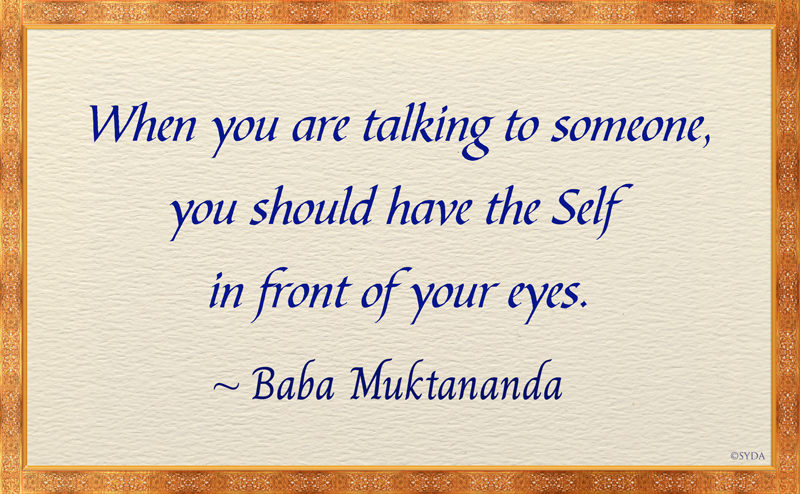Savoring Baba’s Words
Commentary III

by Barrie Risman
Baba Muktananda imparts this teaching about Siddha Yoga sādhanā:
When you are talking to someone, you should have the Self in front of your eyes.1
To enrich your study, I will be explaining the main words of this teaching and describing how you can put it into practice. To me, this approach is somewhat like delighting in an exquisite floral arrangement by noticing the shape, color, and texture of each individual flower to better appreciate the composition and beauty of the whole bouquet.
The main words and phrases in this teaching are talking, Self, and in front of your eyes.
Looking at the Three Terms
Talking means to express or exchange ideas by means of spoken words. “Talking to someone” involves both speaking and listening. Therefore, I will examine both words.

One term for “talking” in Sanskrit is वचन (vacana), and a few of its meanings are “speaking,” “talking,” “expressing,” and “declaring.”
In the Indian scriptures the power of speech, or vāc in Sanskrit, is revered as a divine power. Understanding the sacredness of speech enhances our respect for the potency of language. We consider the effect of our words before we speak. We are thoughtful about when we speak and choose words that are kind, beneficial, and uplifting.

In Sanskrit, the word श्रवण (śravaṇa) refers to the act of hearing or listening, and by implication, studying or learning. Śravaṇa is also a term for listening to the words of the Guru and the wisdom of the scriptures to obtain the knowledge of the Self. In the context of speaking with another person, listening, or śravaṇa, implies more than just hearing someone’s voice. It means being sincerely attentive, present, and receptive to what they are saying.
If the other person is still talking and instead of listening, we are thinking, for example, about how we will respond with our own views, then we aren’t able to listen to what they are actually saying. This reinforces our sense of separateness from the person we are speaking with. On the other hand, when we recognize the light of the Self in another person, we are able to listen to them with generosity, kind consideration, and an open mind. We give them our full attention and as a result they are able to feel heard in a way that fosters genuine connection and mutual respect.

A Sanskrit term for the Self, as you learned in Swami Akhandananda’s Commentary I in Savoring Baba’s Words, is आत्मन् (ātman). This derives from the Sanskrit roots – āt, which means “that which moves and pervades everywhere” and –an, which means “to breathe.” The ātman becomes all objects and beings. It is the conscious power that makes us alive and aware. Another way the ātman is described is as the light of supreme Consciousness, which shines within all human beings as their truest nature. As we come to know and experience this, we understand that each person embodies the light of the Self just as they are.

The phrase in front of your eyes refers to the location of that which is directly before you, what you are looking at that is clearly and plainly visible to you. A Sanskrit term that corresponds to this English phrase is साक्षात् (sākṣāt), which means “in front of one’s eyes,” “to see directly,” “to see that which is right there,” and “direct perception.”
So when Baba tells us, “When you are talking with someone, you should have the Self in front of your eyes,” his teaching applies to whoever is present before you, as well as your perception of that person.
This “vision” of the Self is more than just what you see with your eyes. It’s acknowledging the Consciousness shining within you and in the other person. When you are with another person, you see them as a form of the Self. Then, when you talk to them, you can feel you’re addressing the Self within them. Once you perceive that the Self shines within them, then even if you disagree with their views, you will be able to listen to them. And as you speak with them, you will be able to see their essential goodness and experience your own.
Recently, I had a situation in my work where I had doubts about a colleague’s ability to fulfill their responsibilities on a project I was overseeing. I became aware that my mind was jumping to conclusions about their motivations and level of commitment.
Before addressing this with the person directly, I made the intention to see them as the Self. As a result, I was able to articulate my concerns with clarity and kindness. I made the effort to listen to what they had to say with sincere curiosity. As they spoke, I was able to set aside my assumptions and hear them with an open mind.
By perceiving this person as the Self, I was able to listen to them with empathy and compassion. I gained a greater understanding of their situation, and our project was able to move forward in a harmonious and productive way. Later, they told me that they felt cared for and supported by our exchange, and our affinity for each other grew.
Applying Baba’s Words
Now I’ll describe the steps I follow to practice this teaching.
As in the situation I just recounted, in preparing for a conversation, I make the intention to hold the outlook of the Self during the interaction.
At the start of the conversation, I soften anywhere I notice tension or holding in my body. When I am physically comfortable, it is much easier to stay connected to my awareness of the Self in the person I’m talking to.
Next, I become aware of my breathing. Focusing on my breath keeps me in the present moment and helps me to stay grounded in the outlook of the Self.
As I’m talking, I sense the back of my body. My focus typically settles on my upper back, the back of my head, or the points of contact with the chair I’m sitting on. I relax the muscles behind my eyes and become aware of my peripheral vision. This anchors me in a spacious awareness of the Self within me and in the other person.
Centered in this awareness, I am able to listen with greater empathy. I can discern my own assumptions, so they don’t color how I hear the other person. I am able to respect another person’s views even when their perspective differs from mine.
In fact, practicing Baba’s teaching is extremely valuable when conversations don’t turn out the way I had hoped, because it gives me the ability to let go of any frustration or disappointment I might feel and instead remain aware of the Self in the other person.
Practicing Baba’s teaching gives me a way to spread happiness and goodwill—through an uplifting sentiment, a compliment, or an understanding nod and smile. Everyday interactions become occasions to express the joyous and benevolent outlook of the Self. Perceiving others as the Self nourishes and strengthens my connection to the Self within me. These are some of the many benefits I experience from applying Baba’s words.
Let’s revisit Baba’s instruction:
When you are talking to someone, you should have the Self in front of your eyes.
Inwardly repeat Baba’s words and let them settle into your being.
Visualize a person that you talk to regularly.
Imagine talking to them while holding the awareness that they embody the same Self that resides within you.
What does it feel like to “have the Self in front of your eyes” as you speak and as you listen?
How would this practice benefit you and those around you?
As you continue to study Baba’s teaching, enjoy finding occasions to practice it during your day, and discover the many ways that talking to someone while seeing them as the Self uplifts you and those around you.



